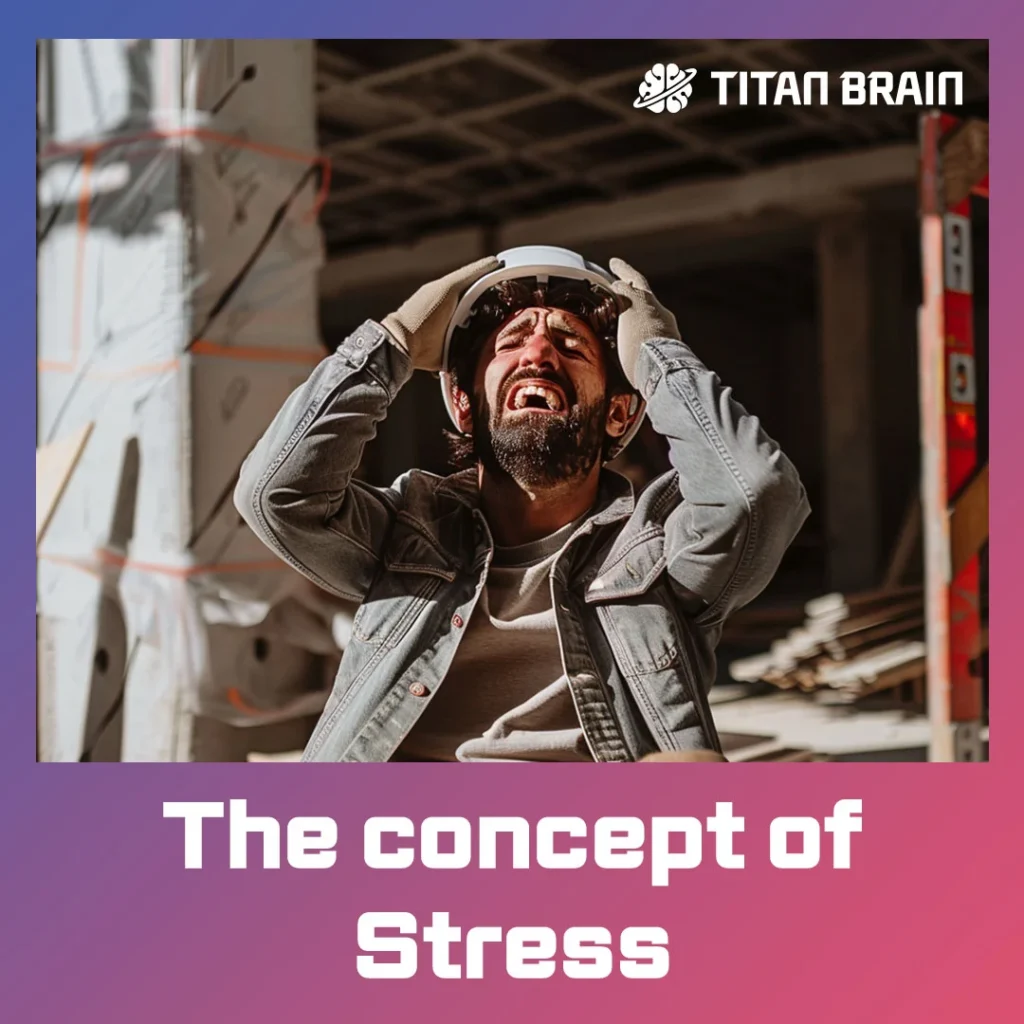To explore what stress is, let’s delve into the concept of stress. Many of us experience significant stress and hardship in life. Considering the adage “know thy enemy to win a hundred battles,” if we view stress as the enemy, we must thoroughly understand it to defeat it. We will examine the concept of stress to understand why we experience it.
1. Conceptual Definition of Stress
Numerous scholars, including psychologists, have attempted to define stress effectively, but today the concept of stress is used ambiguously and is difficult to define precisely.
The dictionary definition of stress is a psychological and physical state of tension experienced when faced with a difficult environment, which can lead to various physical and mental disorders if it persists long-term.
Stress is the response of an individual to necessary adaptations in a situation, involving physical, mental, and emotional reactions. In such stress situations, responses can be categorized into adaptive and maladaptive responses.
Adaptive Responses are those where the individual effectively copes with the stress situation, maintaining or enhancing personal function.
Maladaptive Responses are ineffective in the stress situation and can have long-term negative effects on personal health.
Tip : Simply put, stress can be seen as a situation where you feel uncomfortable, strained, and pained in thought and emotion. If we can cope with it smoothly, it’s adaptation; if not, it’s maladaptation.
We will explore why humans experience stress and the reactions that occur in the process, based on theories of biological response, environmental events, and human-environment interactions.

2. The concept of stress – Stress as a Biological Response
The biological response related to the concept of stress can be observed through the work of Hans Selye, an endocrinologist active in the 1900s.
In 1956, Hans Selye published his research findings on the physiological responses of biological systems to change, subsequently naming it the General Adaptation Syndrome (GAS).
The General Adaptation Syndrome, also known as the fight-or-flight response, is an activation of the sympathetic nervous system, which Selye described in three stages.
1) Alarm Reaction Stage
The alarm reaction stage is where the physiological responses of the commonly known fight-or-flight syndrome begin.
The fight-or-flight response is a physical system change triggered when a person perceives danger, preparing the body to either confront or escape the threat. This includes increased heart rate and breathing rate, with blood flowing to major muscle groups.
Although these physical reactions are not a severe threat to health, they can make a person feel psychologically uneasy. Since it is literally a state for survival, a significant amount of energy in the body is utilized.
2) Resistance Stage
In the resistance stage, if the stressor continues, the body maintains a defensive state to adapt to the stressor.
The physiological responses initiated in the alarm reaction stage are sustained, using a lot of energy and potentially straining the body as resources are depleted.
If the body successfully adapts to the stress, it can prevent or delay progression to the third stage, exhaustion, and physiological symptoms may disappear.
3) Exhaustion Stage
The exhaustion stage occurs when the body has been exposed to a stressor for an extended period, depleting its energy resources, leaving no reserves to adapt to the stress.
Although the body continues to respond to the stressor, it lacks the fuel for the response system, leading to physical strain and possible damage to immune system functions or other health problems.
Without interventions to aid recovery in the exhaustion stage, the body can become increasingly depleted, potentially leading to death in some cases.
4) Hans Selye’s Research on General Adaptation Syndrome
Selye conducted extensive research on animals in a controlled environment. He performed experiments that induced physiological responses using heat, cold, electric shocks, injections of toxic substances, compulsion, and surgical wounds.
In the theory of stress concepts, Hans Selye’s general adaptation syndrome originally viewed the fight-or-flight response as triggered by physical stimuli.
However, it has now been established that the fight-or-flight response can also manifest in response to psychological and emotional stimuli, not just physical ones.
Psychological and emotional stressors may not be resolved as quickly as physical stressors, leading to the consumption of more adaptation energy, thus chronic and severe stress is considered more likely to cause diseases.

3. The concept of stress – Stress as an Environmental Event
The concept of stress in the environmental events theory emphasizes the environmental factors that cause distressing events for an individual.
When challenging situations arise, they can disrupt personal life patterns, require adjustments in lifestyle, and strain available personal resources.
1) Life Event Stress Scale
In 1967, Miller and Rahe modified the Social Readjustment Rating Scale to introduce the Recent Life Changes Questionnaire (RLCQ).
2) Stress Coping Strategy Inventor
To complement the RLCQ, Amirkhan developed the Coping Strategy Indicator (CSI), focusing on individual perception rather than the events themselves, assessing how individuals react to stress situations through a questionnaire format.

4. The concept of stress – Stress as Human-Environment Interaction
In the concept of stress, stress is emphasized as an interaction between internal variables (within the individual) and external variables (within the environment).
Simply put, it involves examining how humans psychologically react and behave in certain environments, highlighting not only environmental factors but also individual internal characteristics.
1) Triggering Event
A triggering event is a stimulus arising from internal or external environments, and individuals may perceive this event differently. Whether an environment is perceived as stressful depends on the individual’s cognitive evaluation (perspective, interpretation) of the situation, which is a personal assessment of a specific event.
A specific event can trigger certain reactions in an individual, and these reactions are influenced by their evaluation of the event. This cognitive evaluation is divided into primary and secondary evaluations.
2) Individual’s Evaluation of the Event
► 2-1) Primary Evaluation
① Judged as irrelevant : If an event occurs and is deemed unimportant to the individual, it can be judged as irrelevant.
② Moderately-positive evaluation : If an event occurs and is perceived as bringing joy to the individual, it can be evaluated as moderately positive.
③ Evaluated as stressful : If an event is perceived as stressful, it can be due to a perceived threat or challenge, or when there is damage or loss involved.
The process of evaluating damage/loss may be influenced by previous experiences of damage or loss, while the evaluation of threatening natural disasters may be perceived as anticipated damage or loss.
Challenging situations focus more on the benefits or potential growth from the event than the associated risks. Challenges can still induce stress even if the associated emotions are as positive as desire or excitement.
Facing new changes requires the activation of coping mechanisms, where one might experience fear or anxiety due to the potential risks involved in a challenging event, alongside positive emotions.
► 2-2) Secondary Evaluation
Secondary evaluation occurs after an event is assessed as stressful in the primary evaluation, evaluating the individual’s skills, resources, and knowledge available to cope with the stress situation.
Examples of secondary evaluation)
What coping strategies can I use?
Is the chosen coping strategy effective for this situation?
Do I have the ability to use that strategy effectively?
The interaction between the primary evaluation of an event and the secondary evaluation of available coping strategies determines the quality of the adaptive response to stress.
3) Dispositional Factors
Dispositional factors include an individual’s personality or behavior patterns, and past experiences, which can influence how an individual responds and copes with events. Types of dispositional factors include genetic influences, past experiences, and current conditions.
Genetic influences refer to the environmental conditions of personal life that are genetically given, including family history of physical and mental conditions (strengths and weaknesses) and temperament (behavioral traits present at birth and developed afterward).
Past experiences include events that have shaped learning patterns affecting an individual’s adaptive responses, exposure to the same or different stressors, learned coping responses, and levels of adaptation to previous stressors.
Current conditions affect the vulnerability to handle adaptation demands, including current health status, motivation, developmental maturity, intensity and duration of stressors, financial and educational resources, age, existing coping strategies, and support systems from caregivers.
Tip) Combining theory of the stress concept, stress can ultimately be seen as a response that appears based on human thoughts and interpretations of a situation, and the fastest way to alleviate stress might be to change human evaluations of a situation!
Changing human perspectives, interpretations, and evaluations to manage stress can be addressed through Cognitive Behavioral Therapy (CBT), developed by Aaron Beck. Learning CBT techniques can be a way to manage stress.

5. Conclusion and Q&A
We have examined the concept of stress. The concept of stress can be divided into biological responses to stress, environmental events causing stress, and responses through human-environment interaction.
We will explore frequently asked questions and key points related to the concept of stress theory.
1) What are types of stress according to the concept of stress theory?
According to the concept of stress theory, there are three key types of stress: biological stress, which is the physiological response to perceived challenges; environmental stress, caused by external factors; and psychosocial stress, which arises from the interaction between individuals and their environment.
2) I understand the concept of stress theory, but how can we resolve stress?
Synthesizing the concept of stress theory, it becomes evident that humans can experience stress from different environments or stimuli, with human evaluation playing a significant role.
If one can respond positively to any situation, environment, or event, it is possible to experience less stress. Cognitive behavioral therapy techniques are recommended as a method to achieve this.
If you’re curious about stress management or want to learn more about how humans evaluate situations, consider looking at the linked cognitive model article below!
► References and Further Reading
– [Book] “Psychiatric Nursing 9th edition” – Part on the concept of stress by Mary C. Townsend and Karyn I. Morgan, published by Hakjisa Medical
– [Interview] Insights from a psychiatric nurse at OO University Hospital
– Be the Titan Brain


